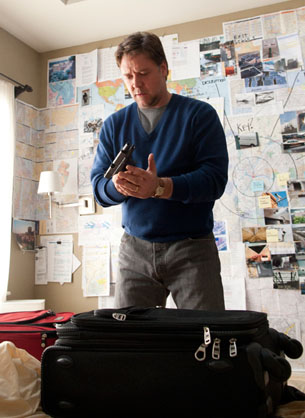Getting people to the theatre to watch an action thriller starring Russell Crowe? Not hard. In fact, it’s a marketing manager’s wet dream. Getting an audience to then engage in meaningful conversation about that thriller, having them contemplate life’s tough questions over post-film pints? That’s a feat that is accomplished in The Next Three Days, written and directed by Paul Haggis.
The film tells the story of a family whose life is abruptly ripped apart when wife and mother Lara Brennan (Elizabeth Banks) is committed for murdering her boss. Her husband John Brennan (Russell Crowe) never questions Lara’s innocence, despite the overwhelming evidence stacked against her. Instead, he earnestly cares for their son Luke, continues his futile fight against the relentless judicial system and, fearing his family will be utterly destroyed, hatches an elaborate plan to break Lara out of jail.
So, would you risk everything to save the person you love? Paul Haggis would, “I would do anything, including probably…and I’ve done this before, destroy myself.” He says, laid back on a sofa, exhaling a cigarette out The Park Hyatt window. The two time Academy Award winner is known for honing in on life changing ‘What ifs?’ In between car chases and crystal meth shakedowns, The Next Three Days asks a lot of them.
I turn the table on Haggis and ask him a big question, “Do you think that trust is the most important element in a marriage?”
“Belief.” He says without hesitation. “Belief is more important than trust. Trust implies a person is trustworthy. Belief doesn’t. You just have to believe. People become what you want them to become. It’s hard. It doesn’t always happen but it’s transformative when it does.”
Suddenly, I find myself wondering if my loved ones are who I think they are or are projections of who I want them to be? I won’t go there, instead I ask about the action hero, Mr. Crowe, who does a fantastic job at playing the middle-aged, middle class college professor turned methodical, balls out criminal.
“Did you have Russell in mind while writing the script?”
“I don’t think of actors when I’m writing. I used to, but I don’t anymore. It’s a huge mistake. You write for something you’ve seen them do, and it’s just insulting.”
Although Haggis may not have written the script with Crowe in mind, it was certainly a no-brainer come time to cast, “Look what he’s done…The Insider, A Beautiful Mind,” he exclaims, “I knew that even though he’s a larger than life character, he’s a deeply complex human being and he’d bring that complexity into the role. He did.” For what it’s worth, I’ll second that.
But Crowe is not the only one receiving praise. Last time I thought of Elizabeth Banks was when she was doing it with Seth Rogen in Kevin Smith’s Zack and Miri Make a Porno. Let me assure you, there is nothing silly about her performance in The Next Three Days. A surprising choice but her and Crowe project steamy chemistry. “She came in to read and just knocked it out of the park.” Haggis says frankly with a smile.
They’re a pair you want to believe in but almost more satisfying than the convincing love story is the finely calculated scheme to escape jail, carefully plotted by Haggis’s protagonist. “I went to do all my research in Pittsburgh, so I mapped the whole thing out. I went online and figured out all those things.” Apparently, beyond that nifty Bic pen/bike lock trick, YouTube can also teach the masses how to break into our neighbours’ back door with a bump key or rob the Fed-ex truck with a tennis ball. The plan is elaborate and impressive but Haggis reminds me, “I’m not an action hero, but if I’m determined, if anyone is determined, you can do amazing things.” (Excuse me for a second while I call to have an alarm system installed.)
So what was more fun, chiseling keys, writing an escape route or flying around in a helicopter on set? “It was fun watching and doing the stunts.” The writer/director admits. “I’d get into the back of the car with the camera and say, ‘Russell, it would be a lot more interesting if you weren’t being towed here, if you actually drove. So, do you mind taking off your coat while you are going through this tunnel?’ We were whipping around cars, he was taking off his coat and realized, ‘We’re going to hit the wall!!” So Elizabeth grabbed the wheel. It was a lot of fun, hairy at times, but always safe.
But things aren’t always fun for Haggis. At around seven minutes into our interview, I decide to get heavy on him, “What does happiness look like to you?”
“There’s a difference between happiness and fulfillment. I can be fulfilled and not happy. I’m often not happy. I’m certainly not happy with most of my work but I have a sense of fulfillment, at times. Shaping a good story, and bringing it to life, that’s fulfilling but it comes at a cost. Most things come at a cost.”
It becomes somewhat painfully clear to me that, albeit with his fame and fortune, Haggis also has an intense internal struggle. This is echoed when he refers to a much-loved quote by Albert Camus, “A guilty conscience needs to confess. A work of art is a confession.”
Suddenly, I wanted to uncork a bottle of red and stay awhile, but I am given the cue by his publicist to wrap it up.
The Next Three Days is much more than an action thriller and Paul Haggis, although a creative genius, is human just like you and me.
~ Jen McNeely
The Next Three Days opens in theatres this weekend. You can watch the trailer here.



 Follow Us On Instagram
Follow Us On Instagram
